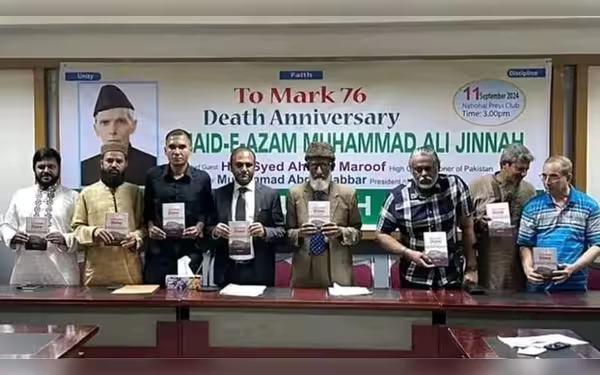Saturday, September 28, 2024 10:21 PM
Quaid-i-Azam's Death Anniversary Commemorated in Dhaka
- First commemoration of Jinnah's death anniversary in Bangladesh.
- Event highlighted historical ties between Bangladesh and Pakistan.
- Speakers emphasized Jinnah's role in Bangladesh's independence.
 Image Credits: dailytimes_pk
Image Credits: dailytimes_pkQuaid-i-Azam Muhammad Ali Jinnah's death anniversary marked for the first time in Dhaka, highlighting historical ties between Bangladesh and Pakistan.
In a historic moment for Bangladesh, the death anniversary of Quaid-i-Azam Muhammad Ali Jinnah was commemorated for the first time in the capital city of Dhaka. This event marked the 76th anniversary of Jinnah's passing, a significant occasion that highlights the complex historical ties between Bangladesh and Pakistan. The commemoration was organized by the Nawab Salimullah Academy and took place at the Tofazzal Hossain Manik Miah Hall within the National Press Club.
The event featured a rich cultural program, including the performance of Urdu songs and the recitation of poetry, which resonated with the attendees. Although the Pakistani high commissioner to Bangladesh was expected to attend as the chief guest, he was unable to make it. However, Deputy High Commissioner Kamran Dhangal was present, emphasizing the importance of the occasion.
During the ceremony, a keynote paper was presented by Prof Dr Mostafizur Rahman, outlining the life and legacy of Jinnah. The president of the academy, Muhammad Abdul Jabbar, along with journalist Mostafa Kamal Mojumder, also attended the event. A notable moment was when poet Jafarul Haq Jafar recited an Urdu poem, while two Pakistani students studying in Bangladesh performed Urdu songs, adding a vibrant touch to the proceedings.
One of the speakers, Md Samsuddin, the convener of the event, made a poignant statement regarding the historical context of Bangladesh's independence. He remarked, "If Bangladesh had not been part of Pakistan in 1947, we would have been in the same position as Kashmir today, with the Indian junta holding weapons to our necks. Bangladesh gained independence because of Pakistan, which Jinnah helped create." This statement reflects the deep-rooted sentiments that some individuals in Bangladesh still hold regarding their historical connection to Pakistan.
Throughout the event, speakers praised Jinnah's pivotal role in the creation of Pakistan, asserting that without his leadership, Bangladesh might not have existed as it does today. Nazrul Islam, another speaker, emphasized the need to preserve the brotherhood between the two nations, expressing hope that both Jinnah's birth and death anniversaries would be observed annually in Bangladesh.
Another attendee highlighted Jinnah's significant contributions, stating that his leadership ended the "political incompetence and strife" that plagued the Indian subcontinent after 1857. He argued that had Jinnah not taken responsibility for Bangladesh in 1947, the region could have faced a fate similar to West Bengal, remaining part of India. This perspective underscores the importance of Jinnah's vision for a united Muslim identity in the region.
Deputy High Commissioner Kamran Dhangal praised Jinnah's leadership within the Muslim League, describing it as "outstanding". He noted that Jinnah's vision for a new nation was clear, advocating for a progressive and inclusive state that reflected a commitment to freedom and tolerance. His contributions, Dhangal stated, are not only revered in Pakistan but also recognized globally.
The commemoration of Jinnah's death anniversary in Bangladesh serves as a reminder of the intertwined histories of the two nations. It highlights the importance of understanding and acknowledging the past while fostering relationships that can lead to a more cooperative future. As Bangladesh continues to navigate its identity and relationships with neighboring countries, events like this can play a crucial role in shaping perceptions and building bridges between communities.













